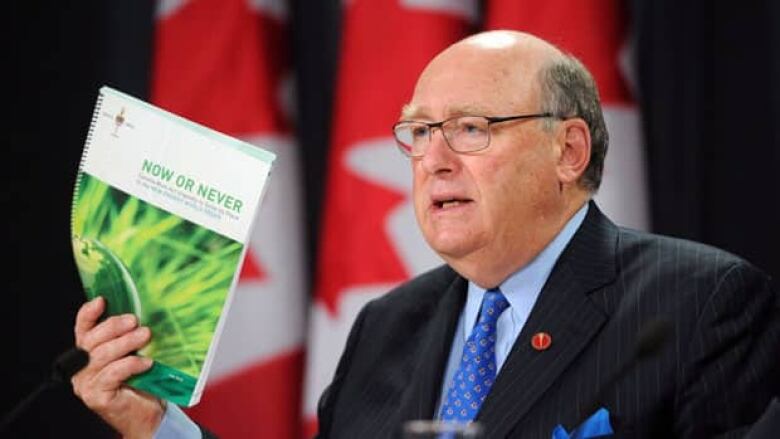Senators see urgent need for national energy policy
Committee report calls for improved environmental performance in oilsands

Canada is on the cusp of global energy greatness but can only reap the benefits ofits vast resources ifit acts immediately, according to a report released today by the Senate's energy,environment and natural resources committee.
The report,three years in the making, outlines 13 "priorities for action," including a call to improve the environmental performance of the oilsands and the need for leadership to guide a coherent energy policy.
"It is imperative that the Canadian governments begin an ongoing dialogue at the highest political level, setting long-term energy goals and securing the social licence from Canadians and the world necessary to proceed," the committee wrote in its report.
Among the more controversial recommendations issupport for natural gas "fracking" in Quebec and New Brunswick.
Fracking, short for hydraulic fracturing, is a way to release natural gas trapped in shale rock deposits. It involves injecting high-pressure water and chemicals into the ground to break up rock and free the methane trapped in its fissures.
The controversy stems from concern that the process can pollute drinking water sources.
The report also calls on governmentsto maximizejobopportunitiesin the energy sector. The committee called for co-operation between the federal, provincial and territorial governments because they share responsibility for employment.
The senators recommend labour market agreements, a focus on targeted immigration and opportunities for the burgeoning aboriginal youth population.
The Conservative government's "one project, one review" for natural resources projects featured prominently in a section about about environmental regulations.
The federal government used this spring's budget implementation legislation to eliminateoverlapping provincial and federal environmental studies, among other changesto speed along the regulatory approval of major resource projects.
"Sure we endorse it [one project, one review]. Because everywhere we went, at the municipal level, at the aboriginal level, at every level of government, we found that the biggest frustration was the time it took to get these projects going," Conservative Senator David Angus, the committee's chair, said.
Premiersconsidering energy strategy
Angus was encouraged thatAlberta Premier Alison Redford has begunwork on a national energy strategyand hoped her efforts would set the tone at next week's Council of the Federation premiers meeting in Halifax.
The report stressed the importance of Canada's energy sector to the nation's financial well-being. It also sought to put a positive spin on an industry that gets a black-eye internationally, particularly because of oilsands development.
"Energy is presently and, hopefully, always will be the mainstay of the Canadian economy and a critical key to our prosperity now and for generations to come," wrote Angus.
The report also covered many well-trod government themes in the Canadian energy narrative. There was an urgent call to access new markets. Thecommittee also issuedrepeated reminders toconsult and include First Nations.
Tides Canada 'perfectly reasonable'
On Wednesday, a coalition of over 700 industry, environmental and aboriginal groups released an energy strategy plan that focused on renewable energy sources: what they are calling a "clean energy accord."
The effort was spearheaded by Tides Canada, an environmental charity.
Tides was at the centre of a controversy about foreign funding for environmental charities. It washauled before the Senate energy committeeearlier this year to answer questions about its activities and connections with American charitable foundations.
"We had Tides Canada," said Angus. "We heard they were terrible people. And they came and they presented to us. We found them to be perfectly reasonable people and they're doing very good things in the energy field and they've produced a report which we like."












_(720p).jpg)


 OFFICIAL HD MUSIC VIDEO.jpg)
.jpg)



























































































